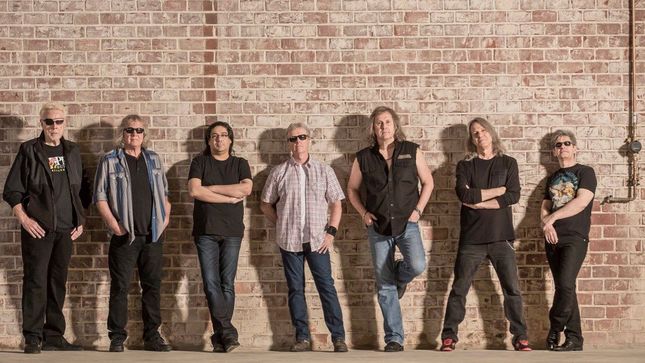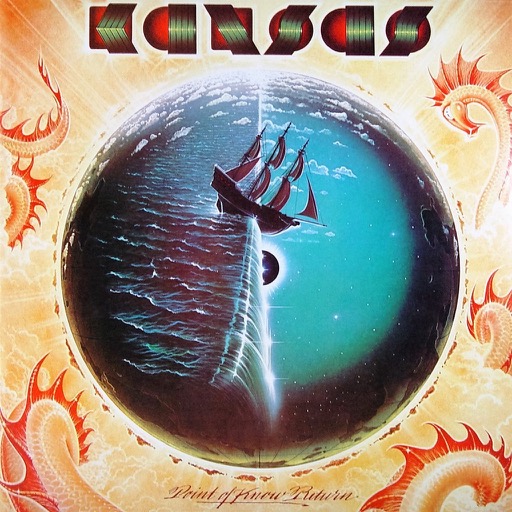KANSAS Founding Member / Guitarist RICH WILLIAMS On Classic Album Point Of Know Return - "There Were A Lot Of Difficulties With The Making Of That Album For Many Reasons"
October 4, 2018, 6 years ago

In a new interview with Classic Rock Revisited, Kansas founding member and guitarist, Rich Williams, sits down with Jeb Wright to talk about the band's Point Of Know Return tour. They also go back in time to the Point Of Know Return and discuss the making of the album. An excerpt follows:
Classic Rock Revisited: Being the 40th anniversary, as you dust off and work up some of these songs does it spark any memories you have about recording the album or the first time you toured the material?
Rich Williams: "I remember the recording more than I remember the tours. There's nothing to compare them to, we were just moving forward and everything was a new experience. The only thing I remember about tours is when they end. Like the end of the Monolith tour. 'OK, see you guys', and then you have no idea what is going to happen next. Everyone is going to go off and do their own thing.
"After the first album, we were all in the same boat, but after a while people have their own lives. They buy houses…go on vacations…record solo projects. The road crew is going off to hook up with other gigs. You wonder, “Will I ever see those people again? Will there be another album? Will we tour again?”
"It's kind of like being in Brigadoon in high school and it's the last performance and everyone is crying because they know they'll never do it again. The end of tours were always more memorable to me than the beginning of them. Now we tour all the time so it never really ends. There is no sadness in Kansasland anymore.
"When I was twenty-five you never knew...even ten years in we didn't know how much longer we'd be doing this. 'You know, we're getting up there. I'm almost thirty-five years old!' After thirty, thirty-five, forty years it is starting to sink in that maybe this is what I do. This is my job, this is my life, this is my career. If I was working somewhere else I'd be retired by now and doing this anyway. Now, there isn't really any wonder in it.
"People ask me 'How much longer are you going to do this?' What would you have me do exactly? Play golf? [sarcastically] That sounds fun. Ride around in golf carts, whack a ball around and say "shit" a lot. That sounds fun for a couple of weeks, maybe, but I'd be soon asking myself, 'My God, what have I done? Why did I quit? I had the greatest job in the world and now I'm hanging around some crappy country club with some old geezers?' I'd rather go roadie for somebody."

CRR: From what I remember from past conversations, Point Of Know Return was not the easiest album to make.
R.W.: "There were a lot of difficulties with the making of that album for many reasons, starting with the personalities involved. Up to that point, the band was like a bunch of pirates out on the open sea. One for all and all for one, kicking ass and taking names. Then Leftoverture happened and kaboom...suddenly we're out of debt with the record company. Suddenly we're making money.
"People were getting married, buying houses, boats and airplanes. Not that it was unfair but there was a balance differential with who got paid what. We signed away our publishing. Don Kirshner was our publisher. This was our only offer, there was no one else banging down our door.
"Don said, 'I'm going to be your publisher.' 'Publishing, what's that?' 'Don't worry, it's just sheet music and crap.' We didn't know it was a pie with three pieces and a third of that pie was publishing. When you see rich rock stars in their mansions, publishing bought that.
"Another third of the pie is songwriter’s royalties. That was Steve or Kerry, or a combination of the two, with a little kickback to the band. The last third of the pie went to the band and its management. All the expenses like recording costs, tour support, travel, making videos, promotion, came out of that third. Any expense incurred, going back to the first album, comes out of that third before you see any money.
"We signed a terrible deal. We got twenty-five cents an album. Selling one million copies only got us $250,000 to pay off all these costs. Even back then, recording an album was an expensive process. It's actually cheaper to record an album now then it was back then. There wasn't all that much money to divvy up to band members.
"The record company got the lion's share with the publishing and the songwriters got a disproportionate amount of money. Any money the band would see was really from touring. Suddenly, certain people are not into working so much. Well sure, they got theirs. And so the dynamic starts to change. Is it good or bad? It's just what happens. Money changes everything. We had that going on when we got into the studio. Previously, where there was unity…In my opinion, this was the beginning of the unraveling of the original six members of Kansas, which eventually led to the split. It was about a lot of things, money being one of them.
"We were also dealing with recording equipment issues. We went back to the same place we recorded Masque and Leftoverture but now we're experiencing all kinds of equipment failures. Of course we're on a time schedule and we're losing entire days as they try to repair tape machines and the console. Finally, we said, “We've got to go” so we left there and went to Nashville to the Woodlands studio. I remember doing all my guitar parts for 'Dust In The Wind' there. Robby [Steinhardt] played all of his violin parts there. The vocal tracks were recorded later in California before we mixed it. We were starting to become very mobile.
"I loved our time in Nashville. We were staying at the Albert Pick Hotel, which, before that, was the Roger Miller Inn. It had seen much better days by the time we got there; it was pretty run down. Up on Music Row there was a place called Spence Manor. It was the first time I had ever seen a hotel like this. It was all suites, no restaurants. It overlooked Webb Pierce's guitar shaped swimming pool. There was no restaurant but there was 24-hour room service. Steak, lobster, whatever you wanted. A waiter in a tuxedo would roll the food into your room. It was fifty bucks more a night than the other place. This was post Leftoverture, we had some money by then.
"Jeff Glixman and I stayed at the Spence Manor. The other guys wouldn't come. They said "Have you lost your minds? Fifty bucks more a night?" So they stayed at that run down old hotel and they got angry over there. They seemed to have a miserable time in Nashville compared to my experience."
Read the full interview at Classic Rock Revisited.











